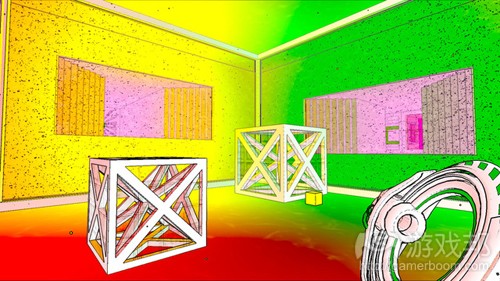开发者分享通过现场活动推广游戏的方法
作者:Kris Graft
在独立游戏开发者所拥有的所有才能中,并不包含市场营销和自我推广的技能。
但是《Antichamber》的开发者Alexander Bruce便是个例外。这位来自澳大利亚的开发者已经成为游戏产业中最具影响力的市场营销者之一了。
只有一个人的工作室
他是如何做到这点?除了《Antichamber》本身就是一款带有出色视觉效果的优秀游戏外,Bruce也使用了传统的方法去推广与测试游戏,并连接那些有可能带来巨大利益的玩家们。经历3年的时间,他终于完成了这款游戏的开发。
在2013年的GDC独立游戏峰会上,Bruce提出了一些基本建议去帮助开发商们更有效地推广自己的游戏:
创造过程:你需要制定一个计划,而“我将面向Steam创造一款游戏并取得巨大的销量”则不是计划。
有许多取得巨大成功的游戏例子。Bruce仔细研究了这些成功的游戏并效仿它们所使用的策略。我们也可以当面进行这种研究,如与这些开发者进行交谈,并向他们学习如何为最后的成功进行规划。
Bruce说道:“当你花时间与这些人见面时,你将从他们身上学到什么是有效的而什么又是无效的。”
将游戏带到展会上将涉及购买展位空间的问题。尽管拥有展位能够帮助你更好地吸引到玩家的注意,但是Bruce也补充道:“拥有展位并不能给予100%的保障。”比起花钱购买一个即时展位,Bruce选择通过《Antichamber》独特且出色的视觉效果去吸引参展者的注意。这款游戏的设计目的便是激起玩家的好奇心。
他说道:“展位只能帮助玩家找到你而已。”不过Bruce也强调,如果你租了一个展位空间,你便可以尽情地在展台上展示游戏了(游戏邦注:并不是所有开发者都会这么做)。
获得可靠的反馈:现场活动能让你观看别人玩游戏—-他们是如何玩游戏,玩多长时间的游戏并会做出何种反应等等。通过吸纳这些反馈你便能够对游戏进行迭代,并将完善后的游戏带到下一次的活动上。
获得真正的玩家:展会本身并不能改变你的命运。小型开发商们必须采取方法去获得更多用户。
Bruce说道:“让玩家能够在意你和游戏。”这也是开发者们必须掌握的技能。仔细思考到底怎么做才能让自己突显于众多竞争者中。对于Bruce,开发《Antichamber》的期间他一直忍受心理和生理上的压力。
Bruce一直努力维持着与媒体和行业先驱的关系,让自己变成“开放,诚实且有准备”的人。
他认为并不存在推动成功的魔弹——那些取得成功的人都是有计划且能将计划落实行动的人。所以请暂时停下手头的工作去制定计划吧。
基于《Double Fine Adventure》的视角
《Double Fine Adventure》(游戏邦注:基于Kickstarter集资的游戏)的品牌经理兼制作人Greg Rice也像我们分享了较大型的工作室是如何利用现场活动。Rice提供了一些诀窍:
选择你的场所:思考怎样的场所最适合自己的游戏。活动是面向产业人士还是消费者?活动参加者是否属于你的目标用户?而活动的时间是否会与你的开发过程发生冲突?
创造演示版本:你还需要考虑演示版本及其长度。Rice说道:“你需要思考如何在短时间内表现出游戏的特点。”
并确保你能够将正确的结构呈现在展会上,Rice笑着说道。
参与展会:当你将作品呈现在参加者面前时,你需要注意以下几点:
保持积极的态度。Rice说道:“当参加者看到你能够轻松地进行演示时,他们最终也能更轻松地玩你的游戏。”
多练习。反复演示该如何在玩家面前呈现你的游戏和演示版本。练习如何边打游戏边介绍。
在展会上尽可能满足玩家。确保准确地回答玩家的问题,并告知他们如何获得更多信息,如通过网站等。
Rice说道:“在制定市场营销计划的时候你也需要发挥与制作游戏一样的创造性。”
(本文为游戏邦/gamerboom.com编译,拒绝任何不保留版权的转载,如需转载请联系:游戏邦)
How to use live events to promote your game
By Kris Graft
For all the talent that small, independent game developers may possess, they’re not typically so skilled in the art of marketing and self-promotion.
That’s not the case for one-man Antichamber developer Alexander Bruce. The Australian has become known in game industry circles as one of the most effective marketers around.
The proof is in the results: Released in January this year, Antichamber has sold over 100,000 units at its full $20 price tag. Bruce has yet to pull the trigger on any promotional discounts.
The one-man studio
How was he able to achieve that? Aside from Antimchamber simply being a good game with striking visuals, Bruce used the convention circuit to promote his game, playtest it and network with people who increased his chances of the game being a commercial success. Over the course of about three years of development, he brought the game to 15-20 conventions.
At GDC 2013′s Independent Games Summit, Bruce offered a few basic pointers to keep in mind when promoting your game:
Develop your process: You need a plan — and saying, “I’ll sell a game on Steam and sell a lot of copies” isn’t a “plan.”
There are plenty of case studies of commercially-successful games. Bruce researched those successes and emulated their strategies. This research can be done at live events — talk to these developers and learn from them so you can form a better plan for success.
“What happens when you put all this time into meeting people…[is] you’ll have a network of people who can tell you what works and what doesn’t,” said Bruce.
Bringing your game to a show might involve buying booth space. While a booth can offer advantages to drawing attention to your game, “Having a booth at an event isn’t a guarantee of anything,” he added. Instead of spending money on a big, flashy booth, Bruce relied on Antichamber’s striking, unique visuals to draw attention from showgoers. The game was essentially designed to bring people in and pique their curiosity.
“A booth gives people a reason to seek you out, instead of others seeking you out,” he said. Bruce also stressed that if you rent booth space, it’s a good idea to actually hang out at the booth and show your game to people (not every developer does this).
Get reliable feedback: Live shows also allow the opportunity to watch people play your game — watch how they play, how long they play it, their reactions to it. Take that feedback home with you and iterate, and do it all over again at the next show.
Attain critical mass: A booth alone won’t change your fortune. A small developer must take steps toward gaining a large audience.
This involves “getting people to care about you and your game,” Bruce said. “…[That's] a skill just like any other. Have a story, and think about what really makes you stand out. For Bruce, he was open about the mental and physical strife he endured while developing Antichamber. That resonated with the press more than the typical rundown of game features.
Bruce made a conscious effort to develop relationships with the press and tastemakers, making himself “open, honest and readily available.”
His takeaway is that there is no magic bullet for success — the ones who have found success had a plan and executed effectively. Stop and think your plan through.
The Double Fine perspective
Greg Rice, brand manager and producer on the Kickstarter-funded game Double Fine Adventure was also on hand to offer the perspective of how a larger studio takes advantage of live events. Rice offered his own tips:
Choosing your venue: Think about what venue is right for your game. Is the event industry-facing, or consumer-facing? What kind of audience are you trying to attract? Does the timing of the event mesh with where you are in the development cycle?
Crafting your demo: Carefully consider the content included in your demo, and its length. “Think about smart ways where you can show what makes your game special, in a short amount of time,” said Rice.
…And make sure you bring the correct build to the show, Rice laughed.
Running the show: When you’re actually presenting in front of an audience at an event, there are some things to keep in mind:
Keep a positive attitude. “Ultimately that’ll make the person playing your game feel more comfortable when they see you’re having a good time,” Rice said.
Practice your messaging. Rehearse how you’ll present your game and demo while in front of a player. Practice talking about your game, while you play it.
Provide a clear takeaway for players at the show. Make sure questions are answered, and that they know how to get more information, such as a website.
“Be as creative as you are in your games with your marketing plan,” Rice said. (source:gamasutra)








































 闽公网安备35020302001549号
闽公网安备35020302001549号